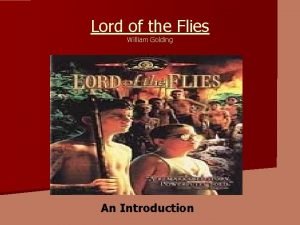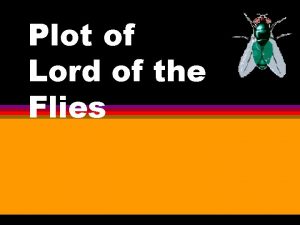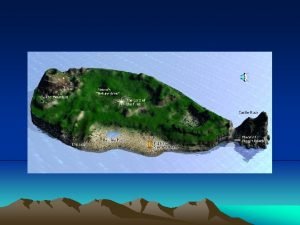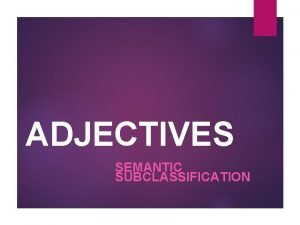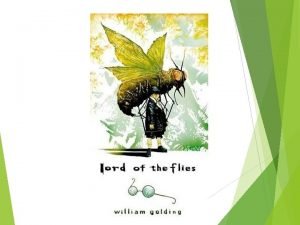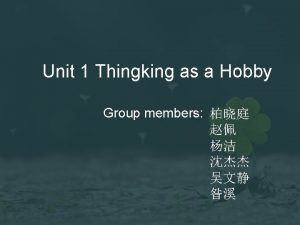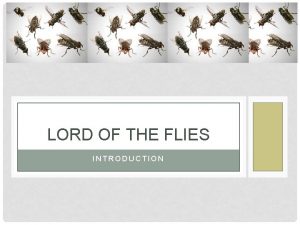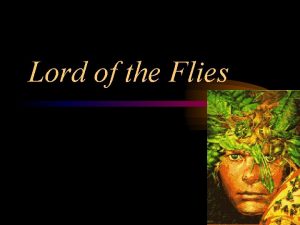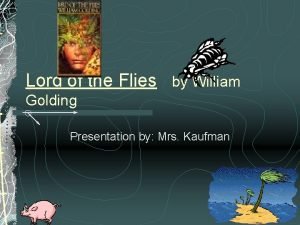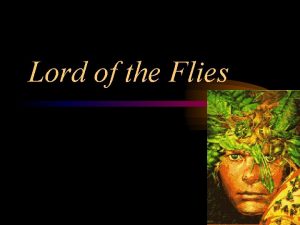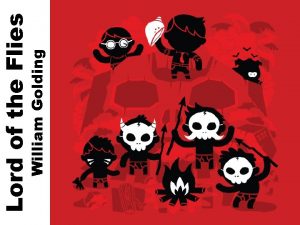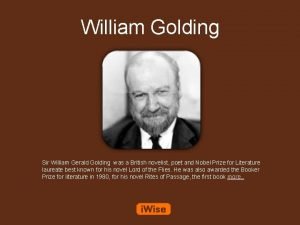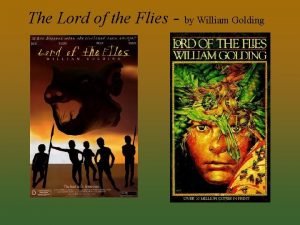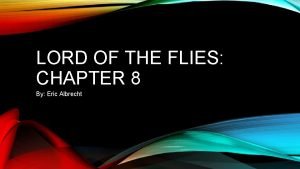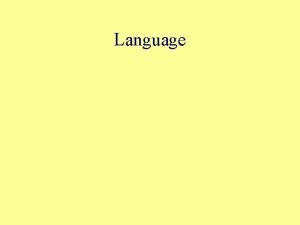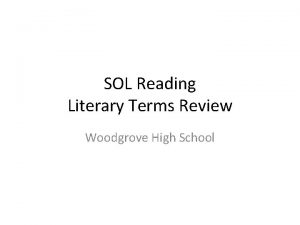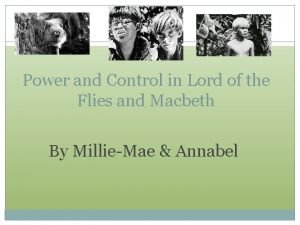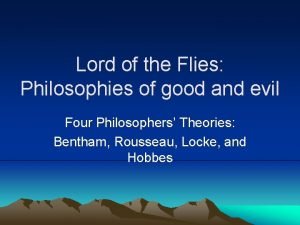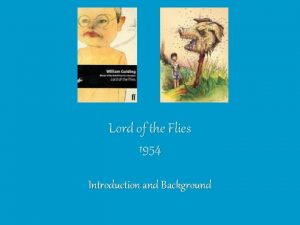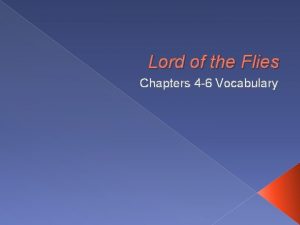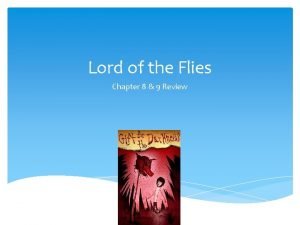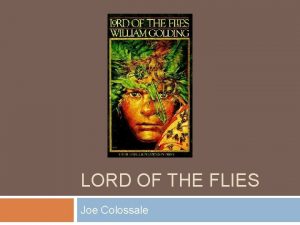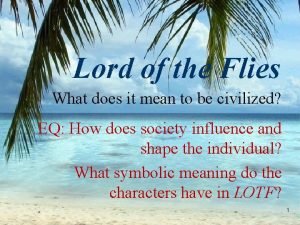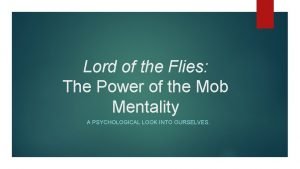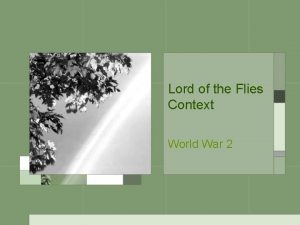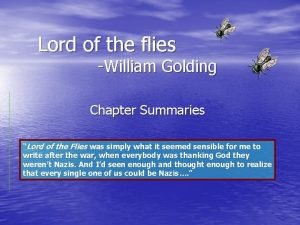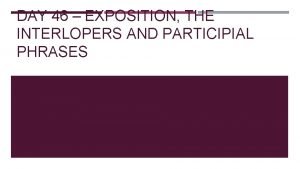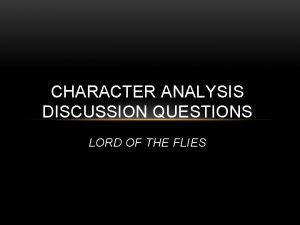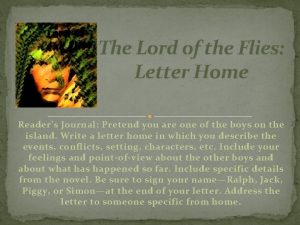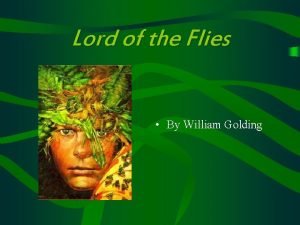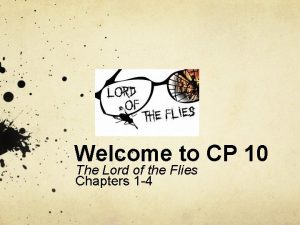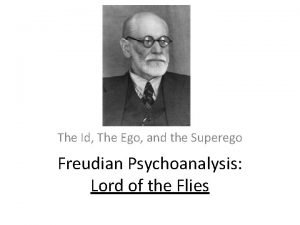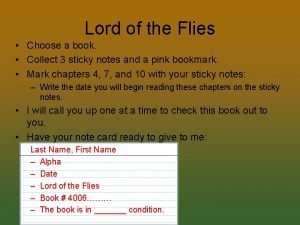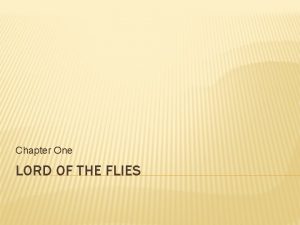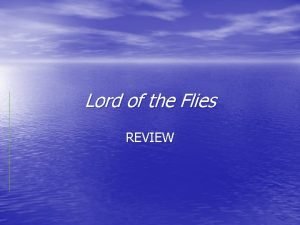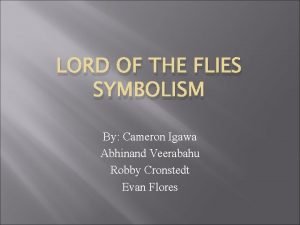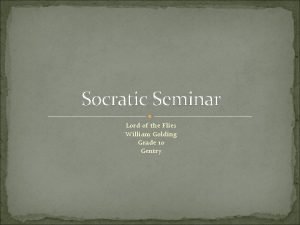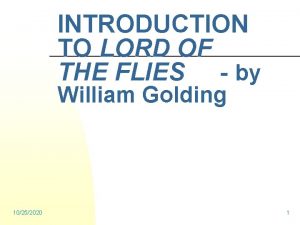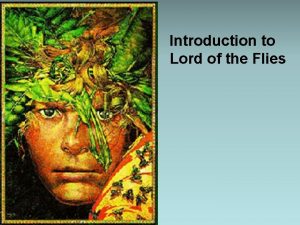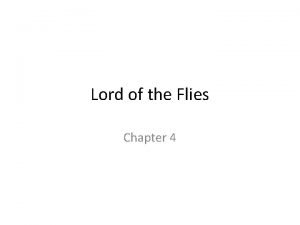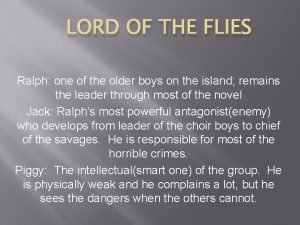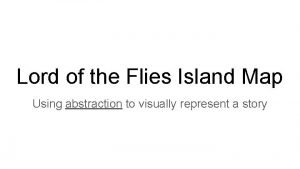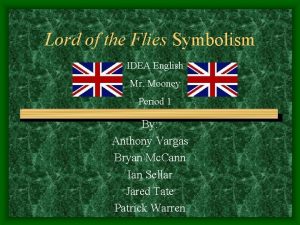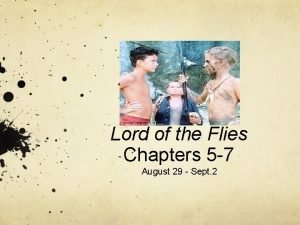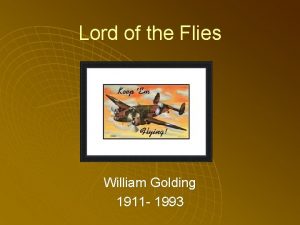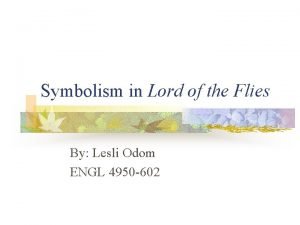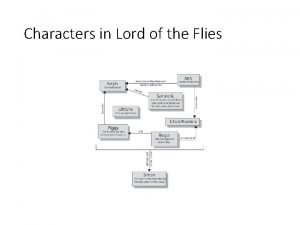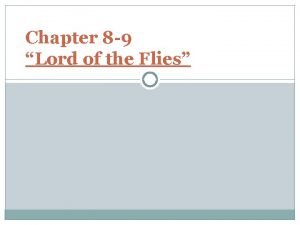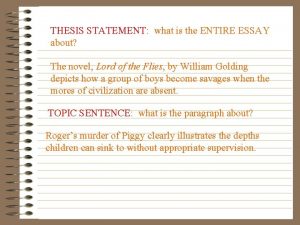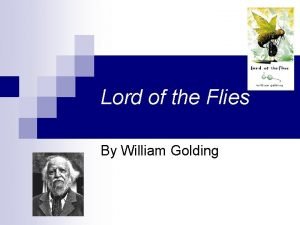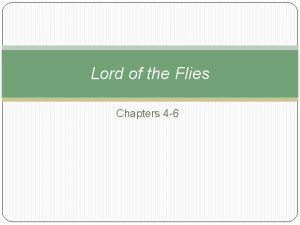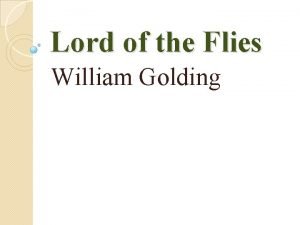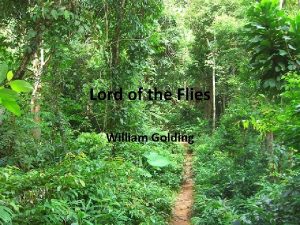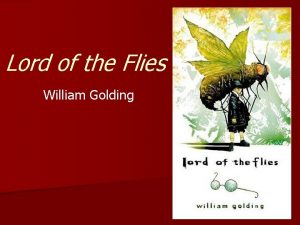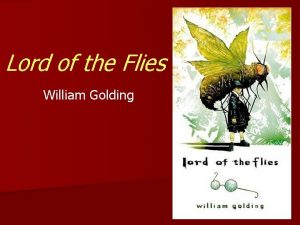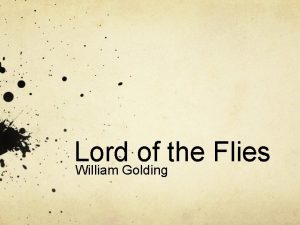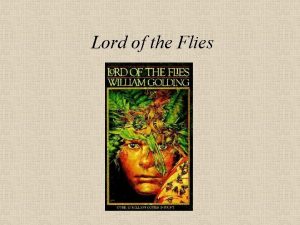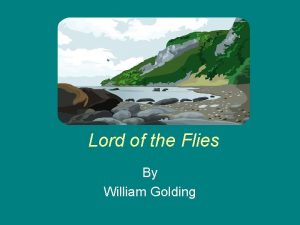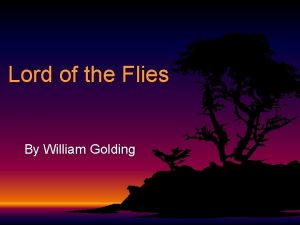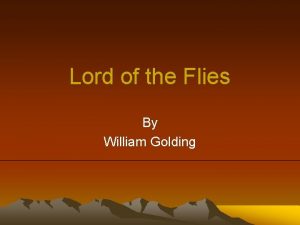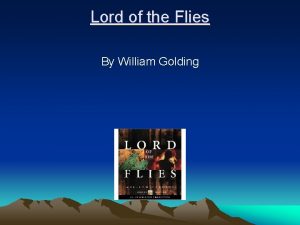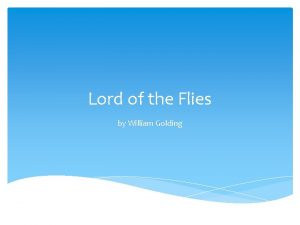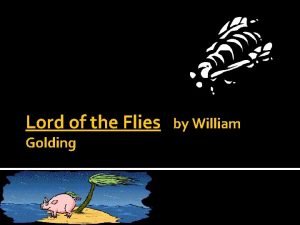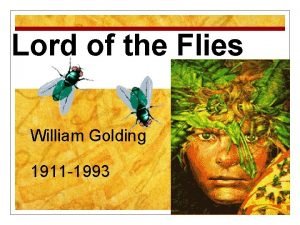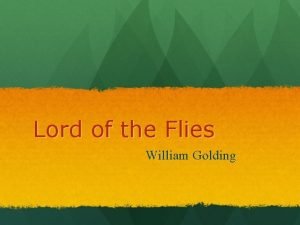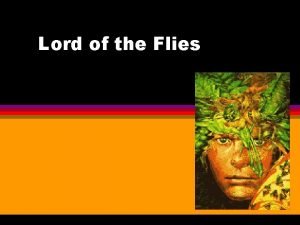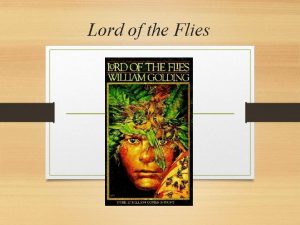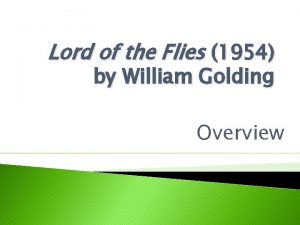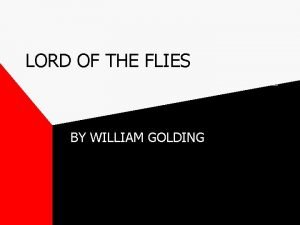Lord of the Flies William Golding THEMES Inherent


























































- Slides: 58

“Lord of the Flies” William Golding

THEMES • Inherent evil of man. • Power and Leadership. • Nature v’s Civility. • Law and Order.

CHAPTER ONE • • MAIN EVENTS: Group of boy’s marooned on an island. Piggy and Ralph first on scene – use conch. Jack Merridew and choir boys arrive – still in robes. Simon, choir, faints. Ralph elected as chief. Piggy’s nickname revealed – obvious target. Ralph, Jack and Simon explore.

COMMENTARY • JACK: • First seen as something “dark. . fumbling along. ” – Already seen as evil. • Calm, self assured. • Vocal aversion to Piggy. – “Fatty. ” • “Uniformed superiority. ” – already sets out his group as different. • “I ought to be chief. ” – arrogance. • Irony that it is the choir who become the hunters. • No time for weakness – lack of pity when Simon faints.

COMMENTARY CONT. • Ralph: • Well built and athletic – natural leader. • “There was a mildness about his mouth and eyes that proclaimed no devil. ” - set up early as the pinnical of good society. • Playful nature – standing on head. • Some meaness – betrays Piggy’s nickname. • Uses conch – the symbol of democracy. • Relies on Piggy’s intelligence. • Comes to symbolise man and civilisation.

COMMENTARY THREE • PIGGY: • Intellectual, but cannot survive in a place without acceptance and adult rule. • Realist - mentions atomic bomb. • Source of only female voice in the novel – “Auntie. ” • Already an outsider. • SIMON: • Christ like figure who loves nature and mankind. • Often faints or has epileptic fits. • ROGER: • “The dark boy. ” • Very intense and secretive- hints at evil that lies beneath.

CHAPTER TWO • • • MAIN EVENTS: Explorers return and call a meeting. The young ones worry about a beast. Agree to start fire to attract attention. The fire burns out of control. The boy with the birth mark disappears.

COMMENTARY • Jack: • Jack is still in control of the choir but they have lost their uniformity. – “Had discarded their cloaks. ” • We see him take Ralph’s power when he encourages the boys to run up the mountain, discarding the authority of the conch – move towards evil. • Desire to kill – “Before I could kill it- but- next time. ” • Boys willingness to follow symbolises the ease with which humanity’s emotional, savage nature overwhelms its rational and civilised tendencies. • Cruelty as he snatches Piggy’s glasses. • His strength attracts the interest of the other boy’s. • Still clings to some semblance of civility – “We’re English; and the English are best at everything. So we’ve got to do the right things. ”

COMMENTARY TWO • Ralph: • Has position of leader but seems uncertain. • Desire to maintain order – “We can’t have everybody talking at once. We’ll have to have ‘Hands up’ like at school. ” • Wins back the boys support with his assertion that they will be rescued – obvious desire to cling onto civilisation and order. • Only when he needs something does Ralph pay attention to Piggy.

COMMENTARY THREE • PIGGY: • Has faith in Ralph’s ability to communicate the issues – “You’re hindering Ralph. You’re not letting him get to the most important thing. ” • Logical mentality – logical to follow the leader. Logical to build a shelter. Contrasts with the emotional boys. • Lacks rapport with the other boys – cannot make himself heard. • Adult voice – “like a crowd of kids. ” and “martyred expression of a parent. ” • See the uprising against Piggy – the adult figure. The battle of physicality against intelligence.

“The Coral Island” - similarities • Written by R. B. Ballantyne: published in 1857 • Set on a tropical island • Main characters named Ralph and Jack • Adventures as boys strive to survive • Themes concerned with morality • Novel ends with their setting sail for home

“The Coral Island” – key differences “The Coral Island” “Lord of the Flies” • Boys, being English, are civilising influence • Englishness seen as moral virtue, bringing with it responsibilities – “the white man’s burden” • Boys’ innocence prevails • Boys bring destruction and death to the island • Englishness claimed as virtue, but shown not to be • Boys’ innocence corrupted – indeed, the concept of innocence questioned

SYMBOLISM • Fire: • Firstly represents hope and aspirations for the future – a tool that separates humankind from the animals. • Duality – “On one side the air was cool, but on the other the fire thrust out a savage arm of heat. ” • Represents the conflicting nature of man. • Fire also helps to highlight Ralph’s perception of their situation. First fire is an act of communal play but becomes more serious as they begin to organise teams to tend it – change from fun to fight for survival. • Ultimately it is about savagery – “Life becomes a race with the fire. ” Primitive attack on piggy to get it started

SYMBOLISM • The Beast: • Represents the evil that is part of human nature. • Lurks in the jungle at night – ready to devour them. Turn into a harmless vine during the day. “He says in the morning it turned into them things like ropes in the trees and hung in the branches. ” • During fire the little boys shriek “ Snakes! Look at the snakes!” – Allusion to the serpent in the Garden of Eden who stole innocence and introduced humanity to its own physicality. • On a conscience level, the boys perceive the beast as an actual animal. However the little boys have an immediate and instinctive recognition that the Island is a threat to them. • Ralph’s reaction – “But I tell you there isn’t a beast!” denying the existence of the dark side of humanity.

CHAPTER THREE • • MAIN EVENTS: Jack goes pig hunting – unsuccessfully. The boys begin to erect shelters. Simon goes off on his own.

COMMENTARY • • JACK: Contrast in how Jack first appeared – Fully dressed in cloak – and how he appears now. “Jack crouched with his face a few inches from the clue, then started forward into the semi darkness of the undergrowth. ” - regression. Described using animalistic terminology. “Dog-like, uncomfortably on all fours. ” “Ape-like among the tangle of trees. ” Has become obsessed with hunting and the desire to kill – “He tried to convey the compulsion to track down and kill that swallowed him up. ” Finds it difficult to express himself verbally, linked with “uncommunicative” Island – move away from civility. Finds it difficult to remember civility has to “think for a moment before he could remember what rescue was. ” Could enforce rules but does not share Ralph’s civilised vision. Still does not believe in the beastie but acknowledges the existence of a threat when he is alone in the jungle – “You can feel as if you’re not hunting, but – being hunted. ”

COMMENTARY CONT. • RALPH: • Still the rational being desperate to make shelters. Takes his duty of caring for the boys very seriously. • We see a difference in the attitudes of Jack and Ralph does not enjoy what he is doing but Jack sees it as an adventure. “But you like it!. . . You want to hunt! While I…” • Still believes more than ever that they will be rescued – “The best thing that we could do is to get ourselves rescued. ” • Resistance when Jack tries to convey his experience of the beast – representative of reasonable society. • Growing disenchantment with Jack and disillusionment with being leader. Sees Jack as undermining his efforts. – “People are not quite what you thought they were. ”

COMMENTARY THREE • SIMON: • This chapter reveals Simon as the Christ like figure. • Golding’s describes his eyes as being “so bright. ” – Symbolises his vision. Later in the novel he will see the truth about the beast. • Takes time to pass down fruit “to the endless, outstretched hands, ” an almost saintly image. • Has a hidden place of meditation which contrasts with Jack’s experience of the Island. When Jack is hunting “pale flowers on a grey trunk” are described but when Simon is alone Golding mentions “red and yellow sprays” and “gaudy butterflies. ” • An atmosphere of calm and tranquillity is evident in Simons place – the darkness holds no terror for him.

CHAPTER FOUR • • MAIN EVENTS: The littluns play on the beach. Jack goes off hunting. Ralph sees the smoke of a boat on the horizon. • He discovers the fire has gone out. • The hunters return with a dead pig. • Ralph is angry and calls a meeting.

COMMENTARY • CHAPTER INSIGHT: • The opening of the chapter describes a microcosm of larger life cycles – the main cycles that govern humanity. For instance, the rise and fall of a great civilisation. • Opening creates contrast to the quiet darkness that ends Chapter 3. Boys are happiest in the morning. Towards noon the heat becomes a “blow” and reality becomes blurred. By midday the sun becomes an “angry eye” forcing the children to hide. Sun is a symbol of power – GOD. • Golding deliberately makes the island an inviting place which provides the boys everything they need to survive. No natural threat to boys, only those within. • Evil is the will to exert power over others: the power to control and to hurt.

COMMENTARY CONT. • Jack: • Finds a way to release his inherent evil by wearing a mask of clay. “The mask was a thing on its own, behind which Jack hid, liberated from shame and self-consciousness. ” Even the other boys become afraid of him. • Refers to mask as “dazzle paint” - camouflage used in warfare, linking his new identity with the adults fighting in war. • Begins to think like an animal. – “They see me, I think. Something pink under the trees. ” • Still disgusted when he notices the blood on his hands. • Costs the boys their rescue but shows little remorse. Contrast with Ralph – distance between the boys grows. • Ritualistic face painting and dancing separates him from the constraints of civilised society.

COMMENTARY CONT • Ralph: • Desire for rescue continues and his anger is evident when he realises that the fire has been allowed to go out – mask of civility slips. • Gulf between Ralph and Jack is evident. Jack is the hunter Ralph is the hunted. “He did desperate violence to his naked body among the rasping creepers so that blood was sliding over him. ” • Anger at Jack is evident – mourning the loss of the world they left behind. • Sees Jack’s apology as a “verbal trick, ” distracting everyone from the tragedy. • Envious of Jack’s victory and the influence it has on the boys.

COMMENTARY CONT. • Roger: • Changed over the weeks. His “unsociable remoteness” is now something “forbidding. ” • Throws stones at Henry – excited and agitated by his desire to hurt a child. • Constrained by social convention – “Here, invisible but strong, was the taboo of the old life. Round the squatting child was the protection of parents and school and policemen and the law. ” • Henry: • Becoming like Jack. • Experiments with mastery over other creatures as he traps small insects. • He became “absorbed beyond happiness as he felt himself exercising control over living things” – desire for power.

CHAPTER FIVE • MAIN EVENTS: • Ralph lays down the ground rules at the meeting. • Jack asserts that the beast is a product of the imagination. • The opinions of Simon and Piggy are ignored but remind us of their spiritual and rational approaches. • Jack storms off from the meeting having undermined Ralph.

COMMENTARY • • Ralph: Starts to think like an adult. Realises the need for Piggy. Realises that civility is crumbling. “We are becoming like animals. ” Considers resigning as chief – “I’ll give up” – hints at the failure of civilisation. • Desire to be rescued is still strong. • • • Jack: Increasingly argumentative, bullying – ignores others, dictator. Dismisses talk of the beast – “there is no beast. ” Attacks Ralph for supporting Piggy. Still does not share Ralph’s view of civility.

COMMENTARY CONT. • Piggy: • Realises the boy’s are becoming primitive – “What are we? Humans? Or animals? Or savages? ” • Rational – claims he does not believe in ghosts. • Clinging to civility and the conch. Voices the necessity for assemblies. • Refers to grown ups on several occasions. “What are grown ups going to think? ” • Simon: • Acknowledges the beast as the apparent evil in everyone.

SYMBOLISM • “Narrow strip of firm beach” – Ralph chooses this to walk on – civility and order. • Ralph’s grey shirt and shorts represent civility. • Clothes are becoming uncomfortable and wearing on Ralph’s thighs – weight of keeping order.

SYMBOLISM • The beast • "maybe it's only us, " Simon suggests. “Simon became inarticulate in his effort to express mankind’s essential illness. ” • To clarify, he asks, "What's the dirtiest thing there is? " Jack answers in a word of "one crude expressive syllable. " • The word is obvious (Golding was too discreet to use it. ) • Excrement • If humans are the beasts, then humans are also excrement (basic metaphor for evil) • Excrement is everywhere on the island (Ch 4). Eating fruit causes diarrhoea, and the island is dotted with faeces.

CHAPTER SIX • • MAIN EVENTS: A dead parachutist lands on the Island. Sam and Eric ‘encounter’ the beast. At a meeting Jack announces it should be hunted down. • The bigger boys, without Piggy, set off to find the beast. • They discover a good place for a fort at the end of the Island.

COMMENTARY • CHAPTER INSIGHT: • Echoes of chapter one when they first explore. • The dead parachutist prevents the boys from keeping alight the fire – affects rescue. Symbolically, a preoccupation with evil (hunting the beast) sidelines attempts at civilised, ordered behaviour (keeping the fire alight. )

COMMENTARY CONT. • Ralph: • Ralph’s new found appreciation for thought is evident. “So we’ve got to think. ” • Wins the boys back after Jack’s challenge by reminding them of their desire to be rescued. • Deep sense of responsibility for the other boys – ventures up castle rock first. • Calm and realistic- “he realised with surprise that he did not really expect to meet any beast and didn’t know what he would do about it if he did. ”

COMMENTARY CONT. • Jack: • Jack challenges, not only Ralph’s authority, but the ritual of the conch and the right to free speech – “We don’t need the conch anymore. We know who ought to say things. ” • First impulse is to hunt the beast – evil. • Fear brings out the dictator in Jack. Declares the beast a “hunter’s job” and challenges Ralph’s authority. • Has no time for those who do not share his opinion. • Simon: • Insight into the nature of the true beast. • “There rose before his inward sight the picture of a human at once heroic and sick. ”

CHAPTER SEVEN • MAIN EVENTS: Ralph is dismayed by the state of the boys. • Jack discovers the tracks of a wild boar. • The boys devise a ritual dance to celebrate the hunt. • Ralph, Jack and Roger climb to the top of the Island discover the dead parachutist. • Terrified by their discovery they flee down the mountain.

COMMENTARY • CHAPTER INSIGHT: • The groups of boys display a lust for conflict: delight in confrontations between Jack and Ralph and frenzied attack on Robert – beast at work. • Golding uses “overmastering” to describe desire to inflict pain. Note that Ralph is ‘carried away by a sudden, thick excitement’ p 142 • Robert realises the need to stay in the group – pretends his hurt is only physical. • Parachutist becomes a symbol of man’s inherent evil which will prevail on the Island. They cannot tend the fire because of the corpse’s presence. • The fallen man – fallen nature – becomes ape-like- primitive. This mirrors the boys’ degeneration.

COMMENTARY • Ralph: • Seeks comfort in the images of home – “everything was goodhumoured and friendly. ” • Sees dirt on boys – manifestation of the inner evil. • Emotional and psychological development – involvement in the pig hunt. “Sunned himself in their new respect and felt that hunting was good after all. ” • Realises that Jack’s priorities and perspectives are present, even if latent, in us all. • Directly asks Jack “why do you hate me? ” Opens up floodgates of aggression - civilised conventions are intended to control this. • Attempts to play down attack by applying civilised constraints. - “It’s just a game. ” However his comments about rugby show games can be painful.

COMMENTARY CONT. • Jack: • Becomes increasingly aggressive towards Ralph and his leadership. • Acknowledges that the “game” must have fatal consequences – primitive. • Described as a “stain in the darkness. ” • • Roger: Other dark stain. “Fighting to get close” during attack on Robert. Replaces Simon in second ascent up the mountain – replacing good with evil (compare chapter 1 ) • Simon: • Sacrificial Role is cemented. Tells Ralph “You’ll get back to where you came from. ” – the implication is Simon will not.

CHAPTER EIGHT • MAIN EVENTS: • The three boys report their encounter with the beast. • The meeting rejects Jack as the new chief after he attempt to undermine Ralph. • The fire is re-lit. • There is a brutal killing of a sow. • They save the pig’s head and put it on a stick as offering to The Beast. A raid takes place to light a cooking fire. • Simon having witnessed this brutal ritual ‘converses’ with the Lord of the Flies and realises the source of evil is within the boys. • A storm is gathering.

The Killing of the Pig • • • Attacks an innocent sow – supreme act of cruelty: Jack’s reaction to his failure with the boar in chapter 7 and with Ralph at the meeting. Setting -takes place in Simon’s secret , sacred place. The hunters have desecrated this place of natural beauty with their foul bloodlust – destroyed Eden. The death of the sow signals the triumph of evil – climax. “…wedded to her in lust. . . Excited…they were heavy and fulfilled upon her”– word choice and imagery has sexual connotations. Jack now takes great delight in the blood on his hands.

“You knew, didn’t you? . . . I’m the reason why it’s no go? ” Literal translation of Greek Beelzebub – evil, the devil Connection with Jack – evil personified Voice of school master. Tries to force Simon to accept savagery. “We’re going to have fun on this Island! So don’t try it on…or else. ” – Changes the concept of fun discussed earlier. THE LORD OF THE FLIES Simon’s dialogue With Lo. TF Reminds us of Christ’s agony In the garden of Gethsemane Before Crucifixion. “We shall do you. ” -Prophecy of -Simon’s death. Flies lack sympathy, consumed by need to eat and multiply. Mirrored in the character of Jack and his obsession.

CHAPTER NINE • MAIN EVENTS: • Simon climbs to the mountain top where he considers the corpse of the dead parachutist. • Having worked out what it is, he makes his way down to tell the other boys. • Below, the boys are indulging in tribal dances. • Simon stumbles into the dancing circle. • The boys kills Simon in their frenzy.

COMMENTARY • CHAPTER INSIGHT: • Storm clouds build up over the Island • As storm reaches climax the boys’ terror turns to desire; the lust to kill. • Great wind blows up, lifting the dead parachutist. The boys rush “screaming into the darkness” as they come face to face with their own evil – killing Simon. • Darkness brings peace and clarity. Lyrical description of Simon’s body being carried off ends the chapter. • Ritual dance replacing Christian prayers – offers comfort in time of uncertainty.

COMMENTARY CONT. • Jack: • At the feast Jack sits like an “idol” , painted and garlanded – to be worshipped. • Has acquired more power but all connected to the desire to kill. No reason or thought. • “Authority sat on his shoulder and chattered in his ear like an ape. ” Devil on his shoulder – animalistic, primitive. • Challenges Ralph – offers food and protection from the beast. • “The conch doesn’t count at this end of the Island. ”

COMMENTARY CONT. • Simon: • Comes face to face with the beast on the top of the mountain. • Simon – like Moses – comes down to offer the truth but finds the other boys wild. • “The mouth of the new circle crunched and screamed” – Savage attack, killed for knowing the truth. • Becomes a scapegoat. • Dies, like Christ, for the sins of his fellow man – accompanied by a storm in Heaven. • Saint like burial at sea.

Discussion Chapters 10 and 11 • Summarise the main events of the chapters • Make notes on each of the main characters (Ralph, Piggy, Roger and Jack) including key quotations to demonstrate how they are developed.

CHAPTER TEN • MAIN EVENTS: • Piggy and Ralph discuss the events of the previous night. • Jack and the hunters have set up camp on the rocky outcrop. • Ralph and Piggy try unsuccessfully to relight the fire. • In an attack on Piggy, the hunters steal his glasses.

COMMENTARY • CHAPTER INSIGHT: • Everyone's guilt is evident when Golding refers to their “befouled bodies. ” • Littluns stay with Ralph represents order, civility and responsibility. The strong must care for the weak. • Difference in reactions of the boys to the death. • Refer to murder as “dance” , “game” – do not want to address horror. • Ralph: • Realises true horror of their actions. Only one to call it “murder. ” • Allows Piggy to justify what has happened. - “I was on the outside too. ” – Does not want to acknowledge his inner evil. • Forgetting home – “Fading knowledge. ”

COMMENTARY CONT. • Piggy: • Rationally tries to justify murder. • “I’m frightened of us. ” He realises that they will become savages if they don’t get rescued. • Naively protects the conch – does not realise that the other boys do not value it. • • Jack: Feels no guilt. No sense of moral responsibility. Rules his tribe with fear and violence. Keeps the beast alive to maintain control. • Does not want others to “sneak in” – does not want civility to return.

COMMENTARY CONT. • Roger: • Sadist. Impressed by Jack’s exertions of power. • He has been longing for release – “assimilating the possibilities of irresponsible authority. ” • Symbolism: • “Then the shelters collapsed with smothering finality. ” – Last vestige of civility.

CHAPTER ELEVEN • MAIN EVENTS: • Ralph is unable to light the fire. • He and Piggy, with Sam and Eric, resolve to see Jack. • A scuffle breaks out between the two groups. • Piggy is killed by a falling rock. • Ralph escapes alone.

COMMENTARY • Chapter Insight: • Bigotry and prejudice become key. Not seeing others as individuals. • Parallels with soldiers who justify killing. • Effect of “otherness” is evident when the twins are tied up. They represent something that is not acceptable.

COMMENTARY CONT. • • • Ralph: Loosing his grasp on reality. Calls for smoke but does not seem to know why they need it. Becomes fallible because he will not admit his feelings. Wants his group to appear civilised when approaching Jack’s – as a reminder of what they have left behind. . Contrast with Samneric who want to put on war paint – desire for survival. Calls Jack “a beast” – apt. Piggy: Still finds comfort in the conch and the civility that it represents – “It’s the only thing we got. ” Still demands action and relies on Ralph. Worries “what’s grown ups goin’ to think? ” – mourning the lose of values and decorum. Code of ethics which is universal – “what’s right. ”

COMMENTARY CONT. • • • Jack: Living out the beast’s urges. Stole, not only glasses, but hope. Does not want conch – does not value what it represents. Once he throws spear at Ralph Golding stops using his name. Calls him “the chief. ” The boy inside is gone, he is just a primitive urge. • Roger: • Relishes role as killer. • Cannot see the boys as humans. “Ralph was a shock of hair and Piggy a bag of fat. ” • Frees him from the restraints of decency. • He feels a sense of “delirious abandonment” when he releases the rock and kills Piggy. • Different from the other boys because he shows no emotion.

SYMBOLISM • The conch is the only tool of authority and morality that is left but it is ineffectual. • Boys no longer respect it. • Evil has triumphed. Spirituality, creativity and religion went with Simon; intellect and reason went with Piggy and rules, authority and tradition go with the conch. • “The conch exploded into a thousand white fragments and ceased to exist. ”

Chapter 12 • Main events: • Ralph is now alone. • He goes to speak to Sam and Eric at Castle Rock. • The next morning, Jock and his group hunt him down. • Isolated, Ralph collapses on the beach where he looks up to see the friendly face of a rescuing naval officer.

COMMENTARY • • • Chapter Insight: Ralph realises that the boys as individuals no longer exist. Hunting has become their identity rather than their activity. Naval officer sees their time on the Island as “fun and games. ” Naval officer echoes Jack’s sentiment in chapter 2 “We’re not savages, we’re English. " Like humanity these boys have had to act on impulses that are at best uncivil and at worst deadly. • All societies possess these deadly impulses. • Savage fire prompts rescue - Use of irony in last chapter, blurs the boundary between civilisation and savagery and implies that the two are more closely li 9 nked than the story has illustrated. • Naval officer reacts to the savage children with disgust, despite the fact that he has come from a world consumed by war.

• JACK: • Makes Ralph an outcast by throwing his spear at him. • Wants Ralph’s head on a stick – ultimate offering to the beast. Victory of evil.

COMMENTARY • • Ralph: Still craves companionship – relies on their “daylight sanity. ” Knew he was an outcast because he “had some sense. ” Reverts to a childish state. Becomes the prey, which brings out his animal instincts. Fundamental drive for survival. Still has sense – wonders what they will eat tomorrow after the fire. When Ralph encounters the Lord of the Flies he finds a skull that “gleamed as white as ever the conch had done. ” – infinite struggle between good and evil. • Knocking it to the ground is a small victory for Ralph over evil. • As he sees the naval officer he does not see his face but his “markings. ” – civilised war paint. • “Ralph wept for the end of innocence, the darkness of man’s heart, and the fall through the air of the true, wise friend called Piggy. ”

TEST YOURSELF • http: //www. nobelprize. org/literature/educati on/golding/index. html
 William golding introduction
William golding introduction Plot of lord of the flies
Plot of lord of the flies Lord of the flies island
Lord of the flies island Classification of adjectives
Classification of adjectives William golding nazi
William golding nazi Thinking as a hobby
Thinking as a hobby William golding born
William golding born William golding substance abuse
William golding substance abuse William golding nazi
William golding nazi Lord of the flies presentation
Lord of the flies presentation William golding interesting facts
William golding interesting facts William golding nazi
William golding nazi William golding childhood
William golding childhood Title of lord of the flies
Title of lord of the flies Lord of the flies chapter 8 analysis
Lord of the flies chapter 8 analysis Time flies like arrow fruit flies like banana
Time flies like arrow fruit flies like banana Shield of shame kim golding
Shield of shame kim golding Berenice golding
Berenice golding Nikki golding
Nikki golding Allegory definition literature
Allegory definition literature Power in lord of the flies
Power in lord of the flies Rousseau lord of the flies
Rousseau lord of the flies Lord of the flies background
Lord of the flies background Emphatic lord of the flies
Emphatic lord of the flies Short summary of chapter 9 lord of the flies
Short summary of chapter 9 lord of the flies Lord of the flies plane
Lord of the flies plane Exposition in lord of the flies
Exposition in lord of the flies A________ is a symbol of power
A________ is a symbol of power Quotes about mob mentality in lord of the flies
Quotes about mob mentality in lord of the flies Lord of the flies and world war 2
Lord of the flies and world war 2 Chapter summaries lord of the flies
Chapter summaries lord of the flies The interlopers exposition
The interlopers exposition Discussion questions for lord of the flies
Discussion questions for lord of the flies Lord of the flies letter home
Lord of the flies letter home Lord of the flies scavenger hunt
Lord of the flies scavenger hunt Lord of the flies
Lord of the flies Figurative language lord of the flies chapter 1
Figurative language lord of the flies chapter 1 Ego defense mechanisms in lord of the flies
Ego defense mechanisms in lord of the flies Samneric
Samneric Simon archetype lord of the flies
Simon archetype lord of the flies Chapter one lord of the flies
Chapter one lord of the flies Lord of the flies christian review
Lord of the flies christian review Roger heaves the rock onto piggy with a sense of
Roger heaves the rock onto piggy with a sense of Socratic seminar questions for lord of the flies
Socratic seminar questions for lord of the flies Lord of the flies social contract
Lord of the flies social contract Introduction to lord of the flies
Introduction to lord of the flies Lord of the flies survival
Lord of the flies survival Chapter 4 lord of the flies summary
Chapter 4 lord of the flies summary Lord of the flies ralph
Lord of the flies ralph Lotf map of island
Lotf map of island Scar definition lord of the flies
Scar definition lord of the flies Lord of the flies chapter 5-7 summary
Lord of the flies chapter 5-7 summary Simpsons lord of the flies
Simpsons lord of the flies What are symbols in lord of the flies
What are symbols in lord of the flies What archetype is piggy from lord of the flies
What archetype is piggy from lord of the flies Lotf chapter 8
Lotf chapter 8 Delirious abandonment definition
Delirious abandonment definition Deus ex machina lord of the flies
Deus ex machina lord of the flies Lord of the flies chapters 4-6 summary
Lord of the flies chapters 4-6 summary
